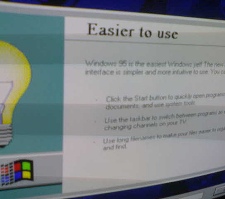 A little more than a year ago, Jason M. visited a small company named Jera Co. to write a proposal for wiring-up their office network. Michael, the office manager, described their environment as being a "simple arrangement with a handful of users." Upon inspection — boy oh boy — how simple it was.
A little more than a year ago, Jason M. visited a small company named Jera Co. to write a proposal for wiring-up their office network. Michael, the office manager, described their environment as being a "simple arrangement with a handful of users." Upon inspection — boy oh boy — how simple it was.
It turned out that the office had only two PCs. One was laptop with Windows 95.A and the other was a Franken-puter sporting an AMD K6-2 Inside badge and Windows NT 4.0. File transfer between the machines were done through a floppy disk, unless of course the file was more than 1.44 megabytes, in which case, it was emailed from one computer to another. It was a kludgy solution to be sure, but that's why they were bringing in Jason.
After some additional checking, he wrote up and presented the estimate, which included adding on a router, running cable, and upgrading both computers to use Ethernet. After letting out a long "hmmmm" and rubbing his wrinkled chin, Michael thanked Jason for his time and said that "I'll let you know."
Welcome Back...Please?
Skip ahead one year to present day, and Jason had all but forgotten about Jera Co. That is, until he suddenly got a call from the office manager. Out of the gate, Michael apologized for not going with Jason's original estimate; while he felt it was a bit high at the time, he would gladly pay twice that amount to save the headache he was currently facing. Apparently, Michael had hired another contractor — coincidently, his brother — and the poor network performance was absolutely killing his office's ability to function.
Jason agreed to stop by, but warned that he couldn't guarantee anything considering the age of the equipment. Michael countered that he'd be "pleasantly surprised" at the network changes in the office: they had finally entered the 21st century thanks to a "happy accident" involving extensive water damage and a need to replace their dying equipment.
Upon arriving the scene, Jason was impressed with the office's new setup - networked printer, two laptops with Vista, desktop, wireless router, the Woiks he figured. After getting out his own laptop and pinging the systems, he was further surprised that that everything checked out. Files were transferred between computers at breakneck speed and there were no obvious sources of interference that would be causing difficulties.
Jason was stymied. He started thinking What slowdowns? Am I nuts? Is Michael nuts? And then he spied the secretary trying to upload some files in a FTP session.
The upload speed was a whopping 5.3kbps.
Slowdown Found
After a thirty second conversation with the secretary, Jason confirmed that yes, this FTP session was the slowdown that was killing the office's productivity.
You see, beside payroll, handling appointments, fielding phone calls, and other general office duties, one of the secretary's duties was to perform regular uploads to their company's website for each client. Historically, that had always been a very time consuming procedure: each client would take between six and ten minutes to update and, with hundreds of clients, their internet connection would be completely consumed for the entire day.
Thinking bad wireless router, cable modem or maybe just a bad cable is to blame, Jason went to the router to see what the source of the internet connection was and found nothing plugged into the WAN port of the router. In fact, he couldn't even find a cable or DSL modem in the wiring closet.
Jason asked Michael, "out of curiosity, who is your internet provider?"
"USA StarWebNet," he replied, "we've been using them for the past 10 years and currently have the 'All You Can Download' package. I think it's $12.95 per month."
It was at that point that Jason had the final clue needed to solve the slowdown mystery: they were using a shared dial-up internet package as the sole connection for the entire office.
"Well there's the problem," Jason said, figuring that he'd be the hero, "you're still using dial-up. You really need to subscribe to cable or DS—"
"That's not gonna happen," Michael interrupted, "we looked into getting broadband internet, but the line to run it to the building costs $180. And the landlord should be paying that, not us."
"Okay," Jason said, a bit confused, "I mean, err..."
"$180 bucks!" Michael growled, "and our cheap landlord won't pay it, and I can't on principle! But that shouldn't matter, since we have the 'All You Can Download' package. It's not as fast, but still."
Jason did his best to explain that bandwidth was the problem, and that "All You Can Download" still has that word "can" in it; one can only download so many bytes on a 56K modem.
"Hmmmmmmm," Michael said, rubbing his wrinkled chin, "thanks for coming out, and I'll let you know."

